Analysis of Mini-Mental State Examination: A Psychology Report
VerifiedAdded on 2023/04/07
|6
|948
|443
Report
AI Summary
This report presents an analysis of a Mini-Mental State Examination (MMSE) conducted on a 73-year-old relative to assess their cognitive condition and awareness of their environment. The examination covered various aspects, including attention, memory, orientation, perceptions, thought processes, thought content, insight, judgment, affect, mood, language, and higher cognitive functions. The results indicated that while the individual's mental condition was generally normal, some attentiveness was lacking at times. The relative demonstrated awareness of personal identity and generally normal thought processes, although occasional irritability was noted. The report concludes that the MMSE provided valuable insights into the individual's cognitive state, revealing both strengths and areas needing attention. Desklib provides a platform for students to access similar solved assignments and past papers for further study.
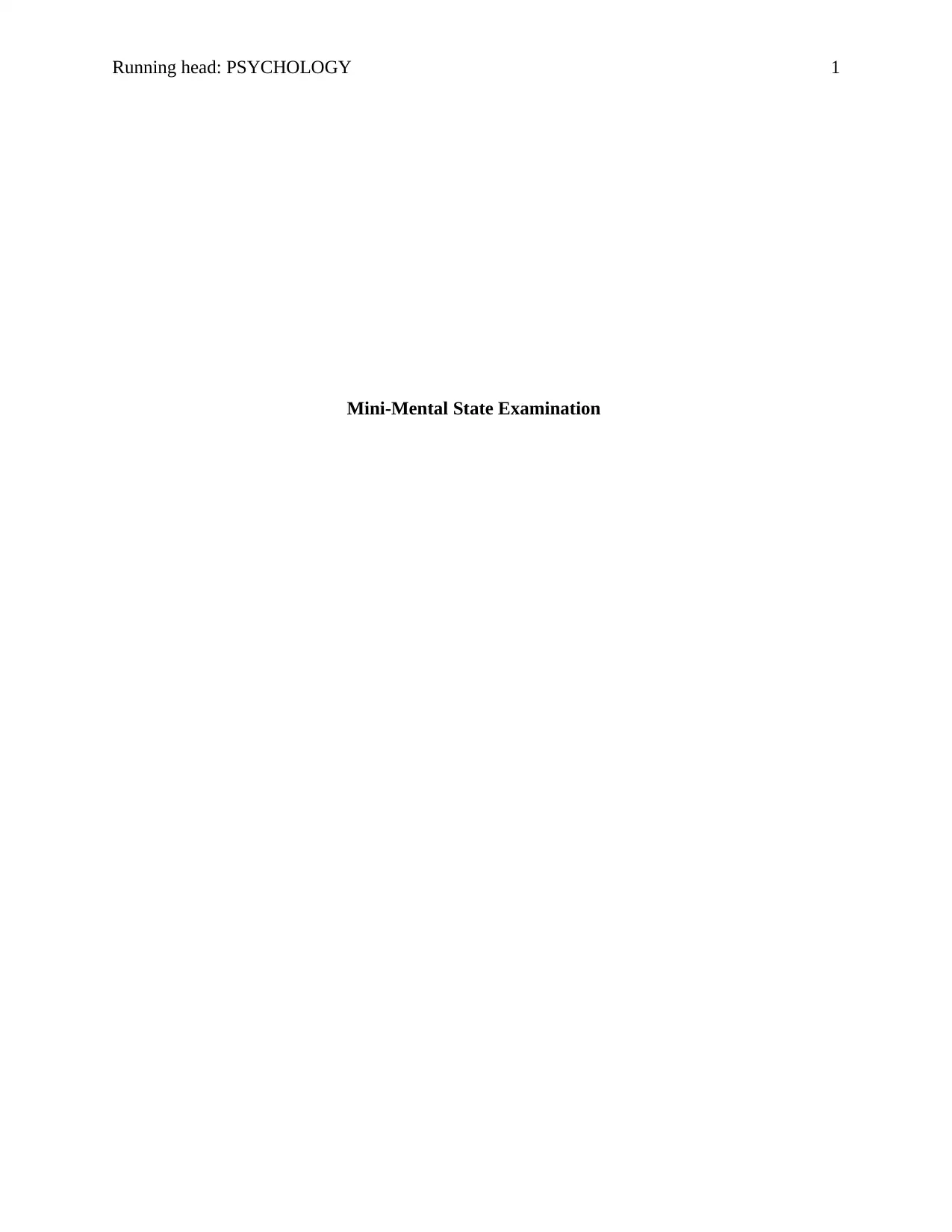
Running head: PSYCHOLOGY 1
Mini-Mental State Examination
Mini-Mental State Examination
Paraphrase This Document
Need a fresh take? Get an instant paraphrase of this document with our AI Paraphraser
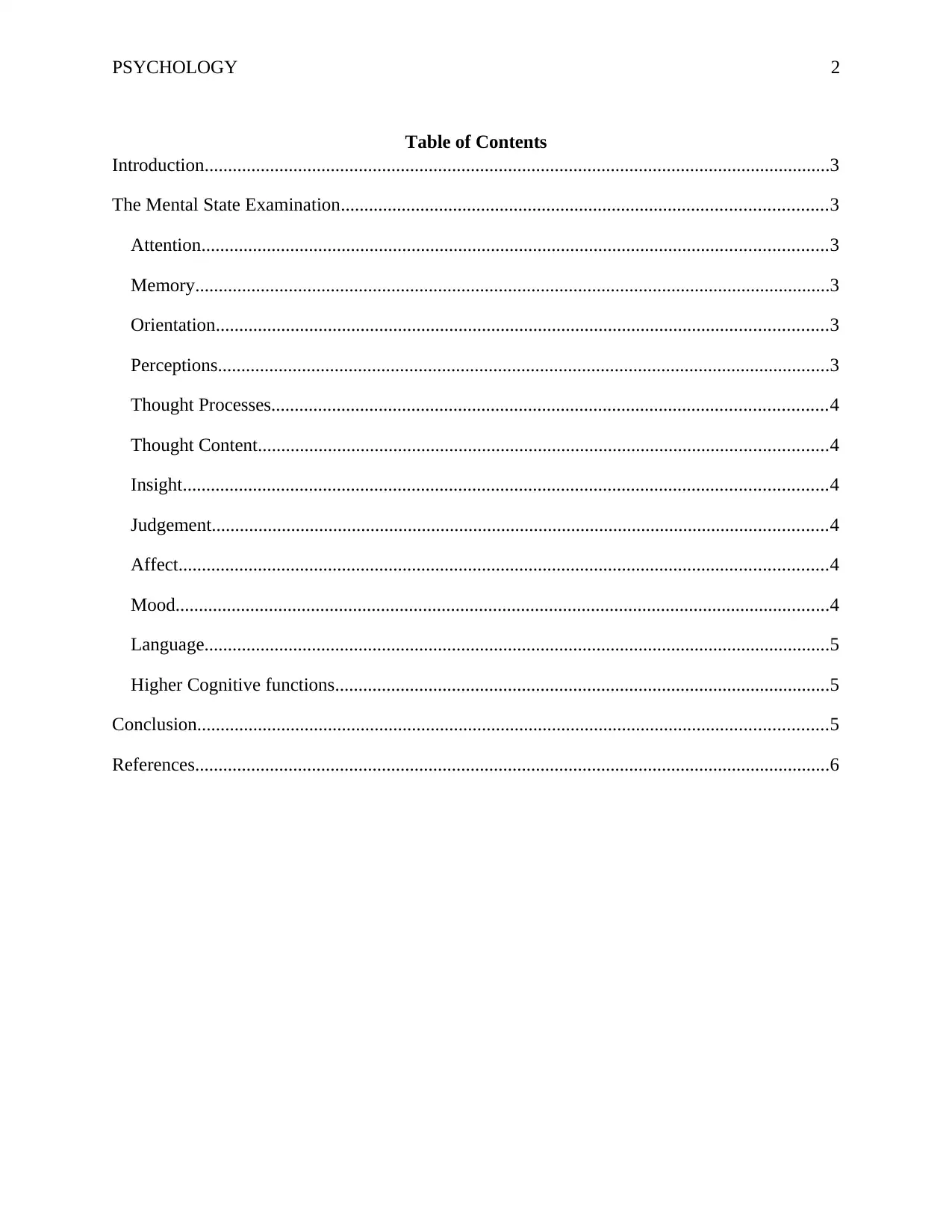
PSYCHOLOGY 2
Table of Contents
Introduction......................................................................................................................................3
The Mental State Examination........................................................................................................3
Attention......................................................................................................................................3
Memory........................................................................................................................................3
Orientation...................................................................................................................................3
Perceptions...................................................................................................................................3
Thought Processes.......................................................................................................................4
Thought Content..........................................................................................................................4
Insight..........................................................................................................................................4
Judgement....................................................................................................................................4
Affect...........................................................................................................................................4
Mood............................................................................................................................................4
Language......................................................................................................................................5
Higher Cognitive functions..........................................................................................................5
Conclusion.......................................................................................................................................5
References........................................................................................................................................6
Table of Contents
Introduction......................................................................................................................................3
The Mental State Examination........................................................................................................3
Attention......................................................................................................................................3
Memory........................................................................................................................................3
Orientation...................................................................................................................................3
Perceptions...................................................................................................................................3
Thought Processes.......................................................................................................................4
Thought Content..........................................................................................................................4
Insight..........................................................................................................................................4
Judgement....................................................................................................................................4
Affect...........................................................................................................................................4
Mood............................................................................................................................................4
Language......................................................................................................................................5
Higher Cognitive functions..........................................................................................................5
Conclusion.......................................................................................................................................5
References........................................................................................................................................6
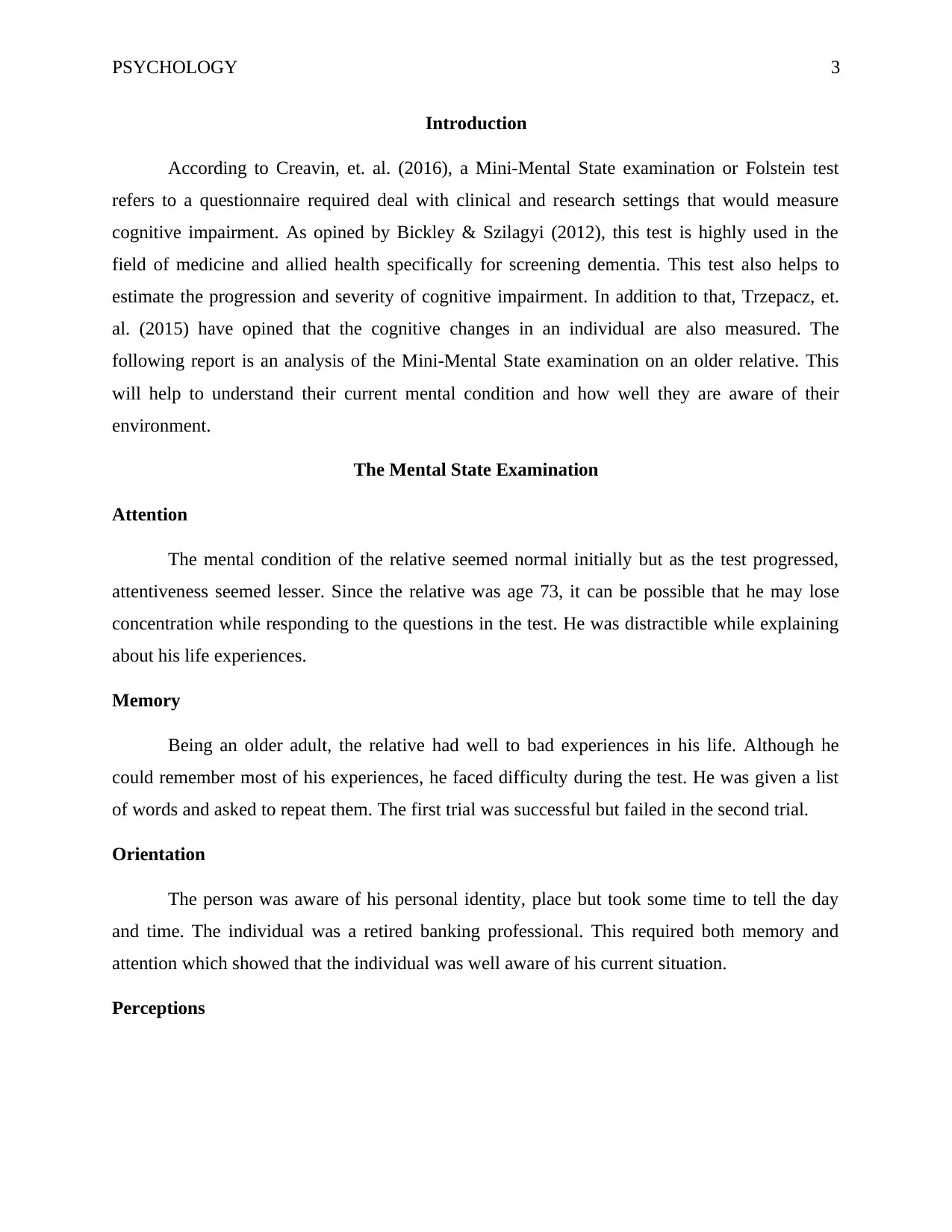
PSYCHOLOGY 3
Introduction
According to Creavin, et. al. (2016), a Mini-Mental State examination or Folstein test
refers to a questionnaire required deal with clinical and research settings that would measure
cognitive impairment. As opined by Bickley & Szilagyi (2012), this test is highly used in the
field of medicine and allied health specifically for screening dementia. This test also helps to
estimate the progression and severity of cognitive impairment. In addition to that, Trzepacz, et.
al. (2015) have opined that the cognitive changes in an individual are also measured. The
following report is an analysis of the Mini-Mental State examination on an older relative. This
will help to understand their current mental condition and how well they are aware of their
environment.
The Mental State Examination
Attention
The mental condition of the relative seemed normal initially but as the test progressed,
attentiveness seemed lesser. Since the relative was age 73, it can be possible that he may lose
concentration while responding to the questions in the test. He was distractible while explaining
about his life experiences.
Memory
Being an older adult, the relative had well to bad experiences in his life. Although he
could remember most of his experiences, he faced difficulty during the test. He was given a list
of words and asked to repeat them. The first trial was successful but failed in the second trial.
Orientation
The person was aware of his personal identity, place but took some time to tell the day
and time. The individual was a retired banking professional. This required both memory and
attention which showed that the individual was well aware of his current situation.
Perceptions
Introduction
According to Creavin, et. al. (2016), a Mini-Mental State examination or Folstein test
refers to a questionnaire required deal with clinical and research settings that would measure
cognitive impairment. As opined by Bickley & Szilagyi (2012), this test is highly used in the
field of medicine and allied health specifically for screening dementia. This test also helps to
estimate the progression and severity of cognitive impairment. In addition to that, Trzepacz, et.
al. (2015) have opined that the cognitive changes in an individual are also measured. The
following report is an analysis of the Mini-Mental State examination on an older relative. This
will help to understand their current mental condition and how well they are aware of their
environment.
The Mental State Examination
Attention
The mental condition of the relative seemed normal initially but as the test progressed,
attentiveness seemed lesser. Since the relative was age 73, it can be possible that he may lose
concentration while responding to the questions in the test. He was distractible while explaining
about his life experiences.
Memory
Being an older adult, the relative had well to bad experiences in his life. Although he
could remember most of his experiences, he faced difficulty during the test. He was given a list
of words and asked to repeat them. The first trial was successful but failed in the second trial.
Orientation
The person was aware of his personal identity, place but took some time to tell the day
and time. The individual was a retired banking professional. This required both memory and
attention which showed that the individual was well aware of his current situation.
Perceptions
⊘ This is a preview!⊘
Do you want full access?
Subscribe today to unlock all pages.

Trusted by 1+ million students worldwide
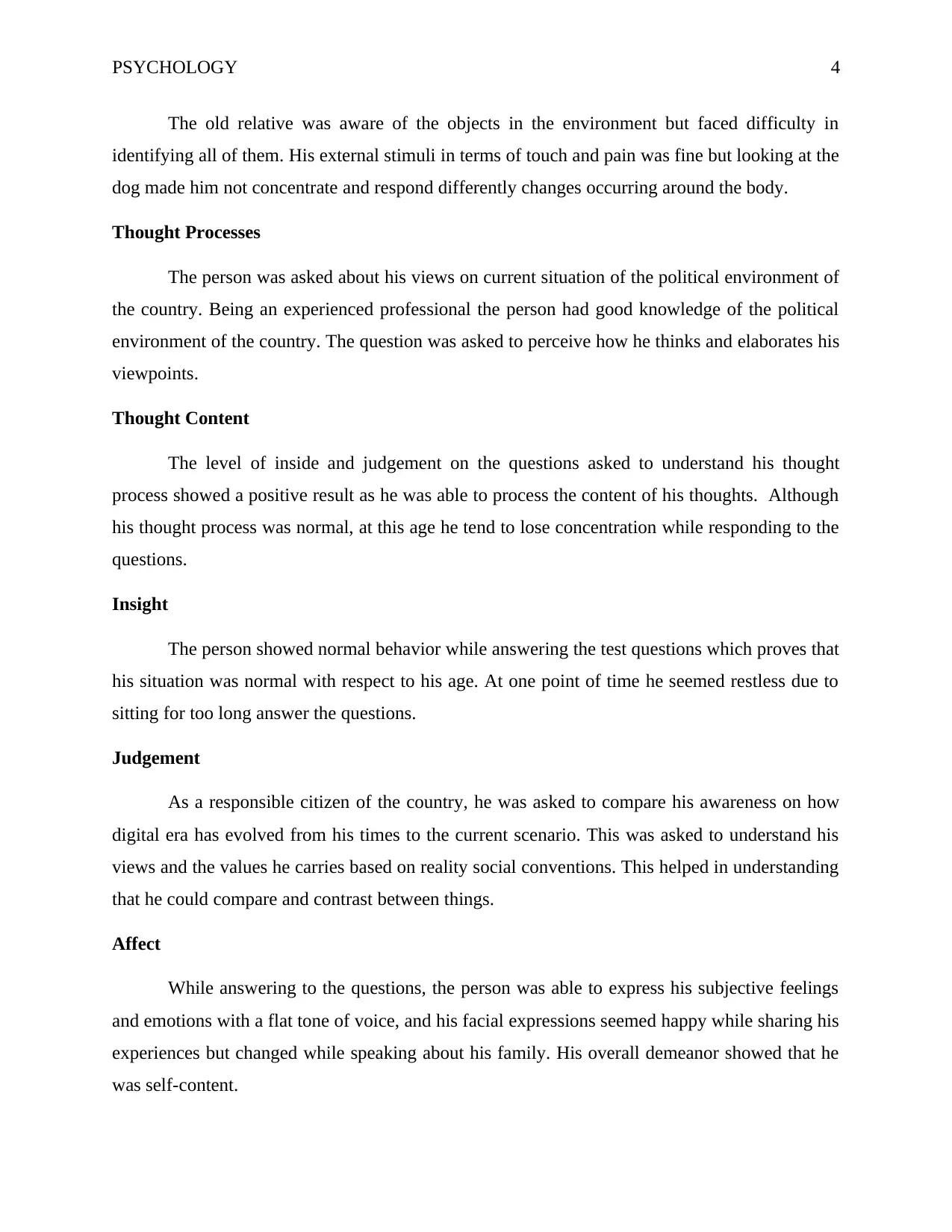
PSYCHOLOGY 4
The old relative was aware of the objects in the environment but faced difficulty in
identifying all of them. His external stimuli in terms of touch and pain was fine but looking at the
dog made him not concentrate and respond differently changes occurring around the body.
Thought Processes
The person was asked about his views on current situation of the political environment of
the country. Being an experienced professional the person had good knowledge of the political
environment of the country. The question was asked to perceive how he thinks and elaborates his
viewpoints.
Thought Content
The level of inside and judgement on the questions asked to understand his thought
process showed a positive result as he was able to process the content of his thoughts. Although
his thought process was normal, at this age he tend to lose concentration while responding to the
questions.
Insight
The person showed normal behavior while answering the test questions which proves that
his situation was normal with respect to his age. At one point of time he seemed restless due to
sitting for too long answer the questions.
Judgement
As a responsible citizen of the country, he was asked to compare his awareness on how
digital era has evolved from his times to the current scenario. This was asked to understand his
views and the values he carries based on reality social conventions. This helped in understanding
that he could compare and contrast between things.
Affect
While answering to the questions, the person was able to express his subjective feelings
and emotions with a flat tone of voice, and his facial expressions seemed happy while sharing his
experiences but changed while speaking about his family. His overall demeanor showed that he
was self-content.
The old relative was aware of the objects in the environment but faced difficulty in
identifying all of them. His external stimuli in terms of touch and pain was fine but looking at the
dog made him not concentrate and respond differently changes occurring around the body.
Thought Processes
The person was asked about his views on current situation of the political environment of
the country. Being an experienced professional the person had good knowledge of the political
environment of the country. The question was asked to perceive how he thinks and elaborates his
viewpoints.
Thought Content
The level of inside and judgement on the questions asked to understand his thought
process showed a positive result as he was able to process the content of his thoughts. Although
his thought process was normal, at this age he tend to lose concentration while responding to the
questions.
Insight
The person showed normal behavior while answering the test questions which proves that
his situation was normal with respect to his age. At one point of time he seemed restless due to
sitting for too long answer the questions.
Judgement
As a responsible citizen of the country, he was asked to compare his awareness on how
digital era has evolved from his times to the current scenario. This was asked to understand his
views and the values he carries based on reality social conventions. This helped in understanding
that he could compare and contrast between things.
Affect
While answering to the questions, the person was able to express his subjective feelings
and emotions with a flat tone of voice, and his facial expressions seemed happy while sharing his
experiences but changed while speaking about his family. His overall demeanor showed that he
was self-content.
Paraphrase This Document
Need a fresh take? Get an instant paraphrase of this document with our AI Paraphraser
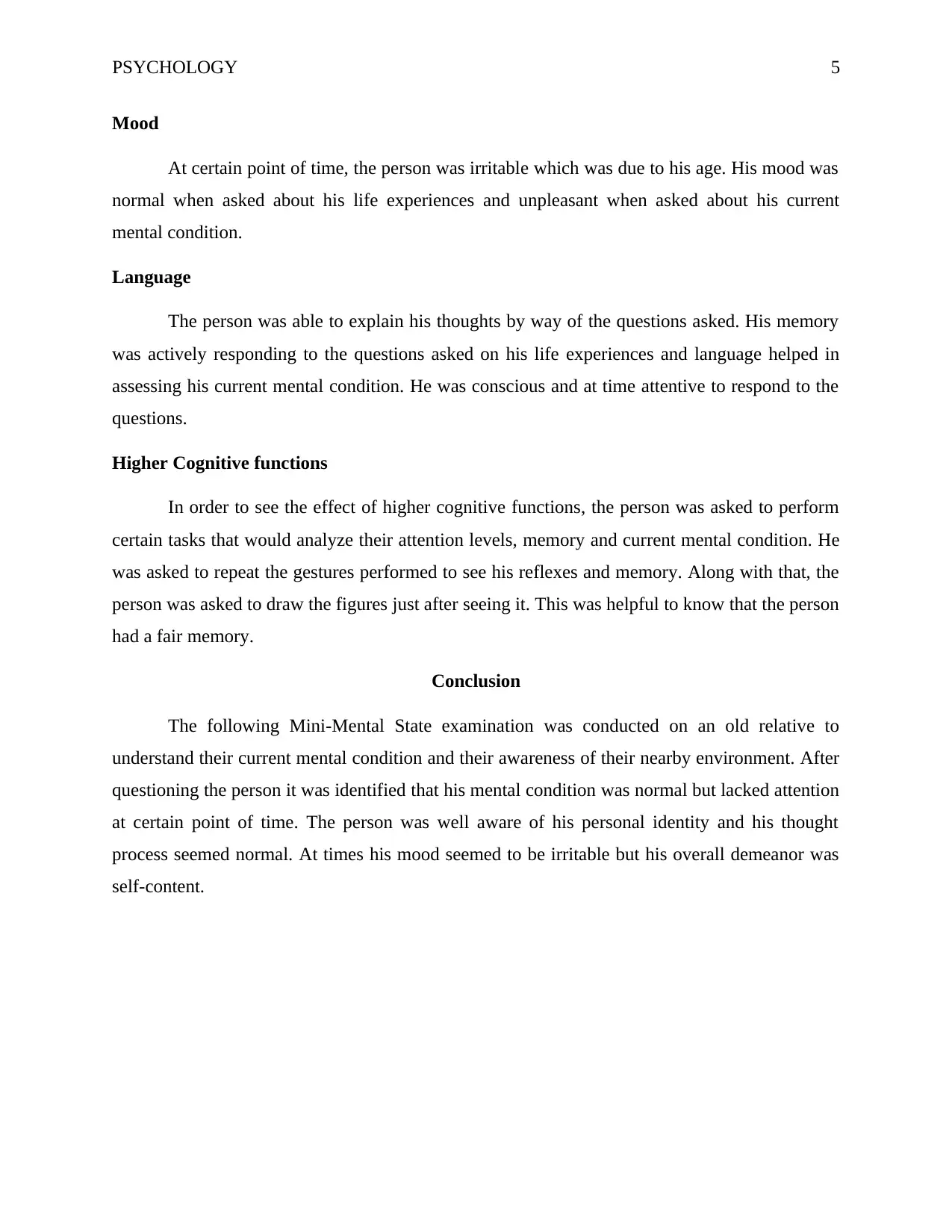
PSYCHOLOGY 5
Mood
At certain point of time, the person was irritable which was due to his age. His mood was
normal when asked about his life experiences and unpleasant when asked about his current
mental condition.
Language
The person was able to explain his thoughts by way of the questions asked. His memory
was actively responding to the questions asked on his life experiences and language helped in
assessing his current mental condition. He was conscious and at time attentive to respond to the
questions.
Higher Cognitive functions
In order to see the effect of higher cognitive functions, the person was asked to perform
certain tasks that would analyze their attention levels, memory and current mental condition. He
was asked to repeat the gestures performed to see his reflexes and memory. Along with that, the
person was asked to draw the figures just after seeing it. This was helpful to know that the person
had a fair memory.
Conclusion
The following Mini-Mental State examination was conducted on an old relative to
understand their current mental condition and their awareness of their nearby environment. After
questioning the person it was identified that his mental condition was normal but lacked attention
at certain point of time. The person was well aware of his personal identity and his thought
process seemed normal. At times his mood seemed to be irritable but his overall demeanor was
self-content.
Mood
At certain point of time, the person was irritable which was due to his age. His mood was
normal when asked about his life experiences and unpleasant when asked about his current
mental condition.
Language
The person was able to explain his thoughts by way of the questions asked. His memory
was actively responding to the questions asked on his life experiences and language helped in
assessing his current mental condition. He was conscious and at time attentive to respond to the
questions.
Higher Cognitive functions
In order to see the effect of higher cognitive functions, the person was asked to perform
certain tasks that would analyze their attention levels, memory and current mental condition. He
was asked to repeat the gestures performed to see his reflexes and memory. Along with that, the
person was asked to draw the figures just after seeing it. This was helpful to know that the person
had a fair memory.
Conclusion
The following Mini-Mental State examination was conducted on an old relative to
understand their current mental condition and their awareness of their nearby environment. After
questioning the person it was identified that his mental condition was normal but lacked attention
at certain point of time. The person was well aware of his personal identity and his thought
process seemed normal. At times his mood seemed to be irritable but his overall demeanor was
self-content.
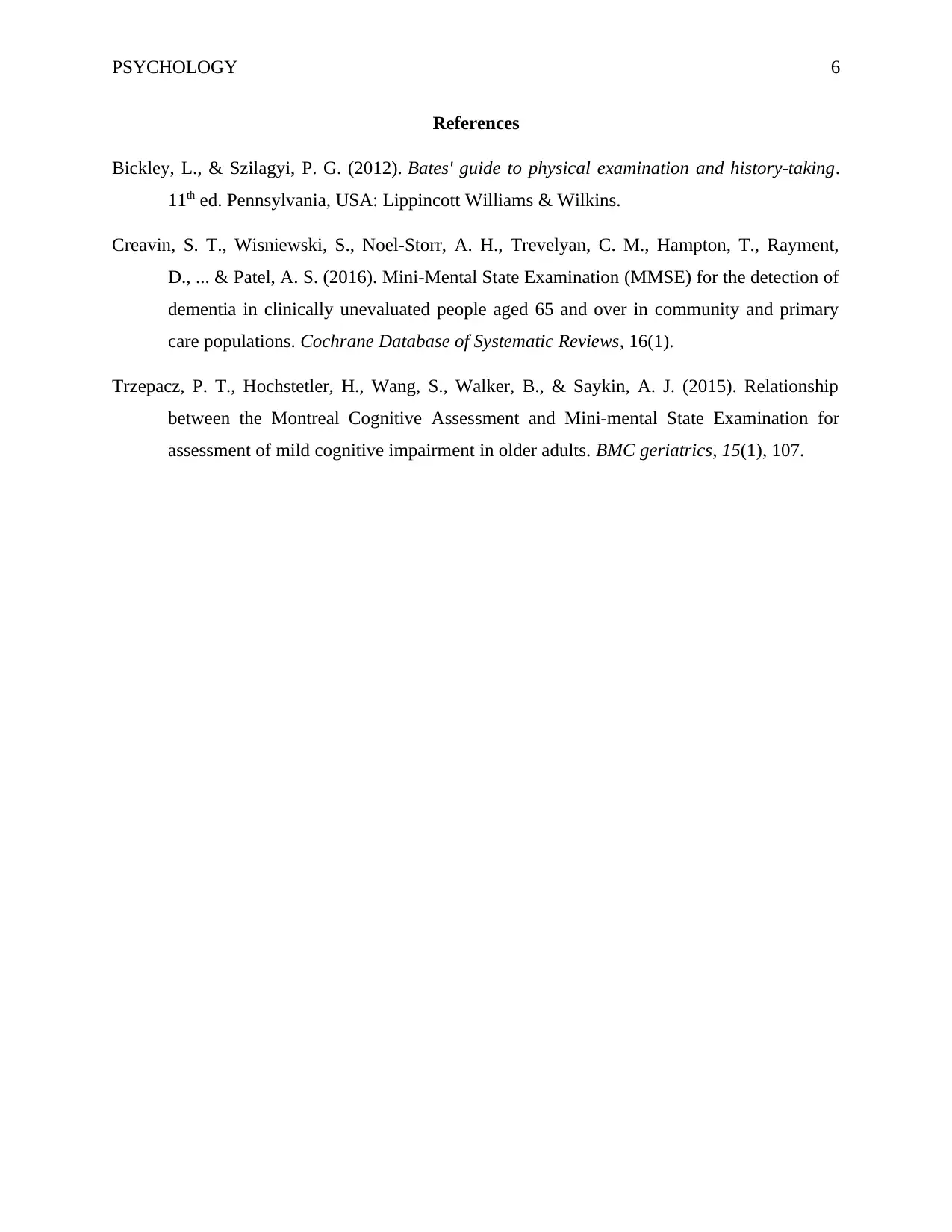
PSYCHOLOGY 6
References
Bickley, L., & Szilagyi, P. G. (2012). Bates' guide to physical examination and history-taking.
11th ed. Pennsylvania, USA: Lippincott Williams & Wilkins.
Creavin, S. T., Wisniewski, S., Noel‐Storr, A. H., Trevelyan, C. M., Hampton, T., Rayment,
D., ... & Patel, A. S. (2016). Mini‐Mental State Examination (MMSE) for the detection of
dementia in clinically unevaluated people aged 65 and over in community and primary
care populations. Cochrane Database of Systematic Reviews, 16(1).
Trzepacz, P. T., Hochstetler, H., Wang, S., Walker, B., & Saykin, A. J. (2015). Relationship
between the Montreal Cognitive Assessment and Mini-mental State Examination for
assessment of mild cognitive impairment in older adults. BMC geriatrics, 15(1), 107.
References
Bickley, L., & Szilagyi, P. G. (2012). Bates' guide to physical examination and history-taking.
11th ed. Pennsylvania, USA: Lippincott Williams & Wilkins.
Creavin, S. T., Wisniewski, S., Noel‐Storr, A. H., Trevelyan, C. M., Hampton, T., Rayment,
D., ... & Patel, A. S. (2016). Mini‐Mental State Examination (MMSE) for the detection of
dementia in clinically unevaluated people aged 65 and over in community and primary
care populations. Cochrane Database of Systematic Reviews, 16(1).
Trzepacz, P. T., Hochstetler, H., Wang, S., Walker, B., & Saykin, A. J. (2015). Relationship
between the Montreal Cognitive Assessment and Mini-mental State Examination for
assessment of mild cognitive impairment in older adults. BMC geriatrics, 15(1), 107.
⊘ This is a preview!⊘
Do you want full access?
Subscribe today to unlock all pages.

Trusted by 1+ million students worldwide
1 out of 6
Related Documents
Your All-in-One AI-Powered Toolkit for Academic Success.
+13062052269
info@desklib.com
Available 24*7 on WhatsApp / Email
![[object Object]](/_next/static/media/star-bottom.7253800d.svg)
Unlock your academic potential
Copyright © 2020–2025 A2Z Services. All Rights Reserved. Developed and managed by ZUCOL.





